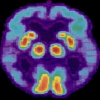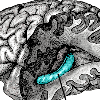While the older generation can still develop any of the other psychological disorders like depression and anxiety, some disorders, including dementia, delirium, and amnesia, tend to first occur in old age.

Image credit: Surrey County Council News
Dementia, which can be caused in older age due to damage from a head injury or stroke or from a disease like Alzheimer's, involves a deterioration in cognitive processes like the ability to think and speak. It continually gets worse as the person ages, and often involves the person forgetting things such as their loved one's name, and eventually they may be unable to recognize anyone they once knew or even objects (agnosia). They may also have issues with speaking (aphasia), completing certain actions (apraxia), and complex behaviors (executive functions).
A disorder that is similar to dementia is delirium, which involves periods of confusion and change in behavior, such as sudden aggression, changes in sleep patterns, disruptions in memory, personality changes, and disorganized thinking. However, unlike dementia, delirium tends to be treatable and the individual can go back to normal functioning with the use of medications that can treat the underlying problem, which can be due to anemia, kidney or liver failure, thyroid disorders, or other mental disorders.
Some drugs can be used to treat these disorders and slow the progression of the symptoms, and it is commonly reported that keeping the body and brain active can help reduce the onset and progression of the disorder.
Unlike both dementia and delirium, amnesia results only in memory loss. The loss can be for new information (anterograde amnesia) or for past memories (retrograde amnesia). Some causes of amnesia are brain injury or stroke, substance use, or malnutrition. The amnesia may be reversible in some cases, and can be treated by treating the brain injury or whatever the underlying cause of the amnesia is.
In later life, with drastic changes like retirement or death of loved ones, the elderly may develop depression, anxiety and substance use disorders. These disorders must be taken seriously and not just thought of as a result of getting older. With appropriate treatment, the older population can live happily for the remainder of their lives.
© BrainMass Inc. brainmass.com June 30, 2024, 9:26 am ad1c9bdddf


